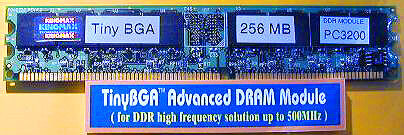Anyone tried it yet? Curious as a UK retailer is meant to be getting some in this week. Haven't seen anything on the Kingmax site, but seen the press release on a few sites about it. Although looks as if DDR400 might never be a standard, even though it seems VIA and others will release chipsets supporting such memory soon.
I also notice the Kingmax PC2700 now come with 6ns chip, instead of 5ns chip as they did before. According to one website, the chips are exactly the same, but to avoid confusion (I guess now they are going to sell PC3200), Kingmax have gone with the industry standard for ratings. Now assuming both PC2700 and PC3200 use the same 5ns chips (just the ones on the PC2700 are labelled 6ns), it might suggest the difference between the two is the quality of the PCB and other components on the PCB that dictate if those chips can reach their rated 200MHz or not. So maybe chip rating is only one part of what makes an overclockable stick of memory?
Will be interesting to see how review sites handle reviewing it, as unless you know what you are doing, reaching 200MHz+ can be troublesome and not always the fault of the memory, at least with motherboards without a good pci divider range. Guess they could easily remove all PCI cards and disable UDMA as a quick way of testing, as that seems to allow many motherboards to run at 200MHz FSB without too much hassle.
I also notice the Kingmax PC2700 now come with 6ns chip, instead of 5ns chip as they did before. According to one website, the chips are exactly the same, but to avoid confusion (I guess now they are going to sell PC3200), Kingmax have gone with the industry standard for ratings. Now assuming both PC2700 and PC3200 use the same 5ns chips (just the ones on the PC2700 are labelled 6ns), it might suggest the difference between the two is the quality of the PCB and other components on the PCB that dictate if those chips can reach their rated 200MHz or not. So maybe chip rating is only one part of what makes an overclockable stick of memory?
Will be interesting to see how review sites handle reviewing it, as unless you know what you are doing, reaching 200MHz+ can be troublesome and not always the fault of the memory, at least with motherboards without a good pci divider range. Guess they could easily remove all PCI cards and disable UDMA as a quick way of testing, as that seems to allow many motherboards to run at 200MHz FSB without too much hassle.
